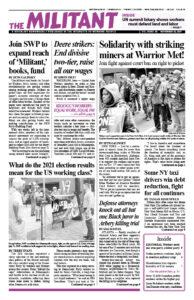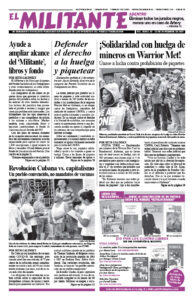November 25, 1996
Class-conscious fighters around the world should loudly protest the imminent imperialist intervention in Central Africa. Using the pretext of a “humanitarian mission” to save refugees and the fig leaf of the United Nations, Paris, at first, and now Washington and Ottawa are pushing to send thousands of troops into eastern Zaire and the surrounding region.
The truth is that the crisis affecting over one million refugees there is a direct result of the policies of Washington and Paris. It is these, which through UN intervention in the early 1960s, crushed the anti-imperialist movement led by elected Prime Minister Patrice Lumumba and put in place the present dictatorship.
Intervention will only deepen the suffering of the toilers. The way forward lies in the struggle of the workers and farmers of the region to rid themselves of imperialist domination.
November 26, 1971
Hundreds of thousands of Chileans turned out to welcome Cuban Premier Fidel Castro when he arrived in Santiago Nov. 10. The trip is Castro’s first to Latin America in over 11 years.
Castro’s trip is taking place at a time when Washington is making increasingly menacing noises about Chile’s nationalization of U. S.-owned copper companies. The first indication that the U.S. was exerting pressure on Chile came last Aug. 11 when the Export-Import Bank rejected a Chilean request for a loan and loan guarantee for the purchase of three Boeing jets.
The mounting economic pressure is also reflected in the fact that during the past year private foreign companies have virtually ended any investment in Chile. The Sept. 28 announcement of Chile’s decision not to pay compensation to Kennecott and Anaconda set off the loudest saber rattling in Washington.
November 23, 1946
The differences between Democrats and Republicans on domestic policy, which have grown smaller in recent years, will dwindle to zero during the next session of Congress. That is the inevitable conclusion from President Truman’s post-election promise of co-operation with the Republican majority. As Truman himself declared, there has been complete agreement between the two capitalist parties on foreign policy.
Truman now offers to extend this bipartisan policy into domestic affairs. “I shall co-operate in every proper manner with members of the Congress,” says the Democratic chief, “and my hope and prayer is that this spirit of co-operation will be reciprocated.”
His administration intends to steer an even more conservative course. This means intensified reaction all along the line, directed first and foremost against organized labor.

